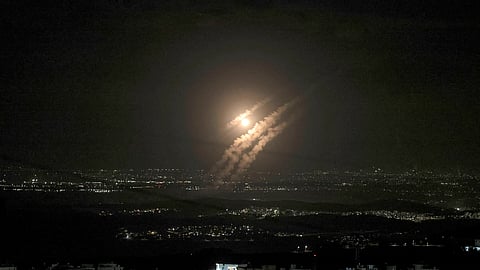

Iran's President Masoud Pezeshkian hailed the missile strikes on Israel as a "decisive response to Israeli aggression" after the Islamic Republic launched nearly 200 missiles into Israel late on Tuesday, which prompted the US to call it a "significant escalation" of tensions in the Middle East.
"In accordance with legitimate rights and with the aim of (establishing) peace and security in Iran and the region, a decisive response has been made to the Zionist regime's aggression," Pezeshkian posted on X.
Meanwhile, the US said that Iran must suffer "consequences" for its ballistic missile attack and that it will coordinate a response with Israeli officials. "Of course, there must be consequences for Iran for this attack," State Department spokesman Matthew Miller told reporters.
"I'm not going to get into what those consequences are today, but there are things on which we will be coordinating with our Israeli counterparts," Miller said.
US Secretary of State Antony Blinken said that Iran's missile attack was "unacceptable" and that the entire world should condemn it. "Initial reports suggest that Israel, with the active support of the United States and other partners, effectively defeated this attack," he told reporters.
The White House, separately, said Iran's ballistic missile assault was "defeated and ineffective" and warned that Tehran could expect severe consequences for the attacks.
"Based on what we know at this point, this attack appears to have been defeated and ineffective," Jake Sullivan, US President Joe Biden's national security advisor, told reporters.
Sullivan hailed US efforts to repel some of the attacks, which involved American naval destroyers shooting down some of the missiles.
"Obviously, this is a significant escalation by Iran, a significant event, and it is equally significant that we were able to step up with Israel," he said.
The White House official would not say what consequences Tehran could expect to face, saying it would discuss "next steps" with Israel.
"We have made clear that there will be consequences, severe consequences, for this attack, and we will work with Israel to make that the case," Sullivan said.
'Prayers and applause' in Jerusalem
Depending on where you were in Jerusalem on Tuesday night, Iran's missile attack on Israel provoked either fervent prayers or cries of joy.
Jewish prayers in an underground car park in west Jerusalem; expressions of joy in Palestinian districts in the Israeli-annexed east of the city.
When the air raid sirens wailed, hundreds of people in the central bus station in the west heeded the military's calls and headed underground to take shelter.
Some of those who gathered in the car park read from religious texts as others stayed glued to their phones.
The dull sound of explosions came from above as Israeli air defences intercepted incoming missiles fired from Iran.
Outside in the open, the dark sky was streaked with light trails from the east, amid the boom of blasts echoing over the Holy City.
In a shelter in Musrara district in west Jerusalem, residents called friends and relatives elsewhere in Israel to exchange news of what was happening.
One man who preferred not to be identified by name told AFP: "We can put things into perspective, but the kids can't."
He gave out sweets to young ones in the car park, "so they don't have bad memories" of the situation.
Children were crying, however, and families continued to arrive amid the wave of alerts.
Some even expressed surprise as they had not heard of the threat, despite repeated warnings broadcast by the authorities for more than an hour.
On the other side of Jerusalem is the Palestinian quarter of Silwan in the east of the city, which Israel seized in the 1967 war and later annexed.
One resident told AFP of the reaction in Silwan when the warnings sounded.
"As soon as the Palestinians heard the first sirens, there were whistles and applause, and there were cries of 'Allahu Akbar!' (God is Greatest)," said one resident of the moment the streaks of fire appeared in the night sky.
She said people did not go to shelters because they don't have any. Instead, they went out into the streets or onto roofs to see what was happening.
Back in west Jerusalem, after all was clear, 17-year-old Alon returned to his small DIY shop. "It's been six months since I've heard the alert in Jerusalem," he said of the first time Israel's arch-enemy Iran attacked with drones and missiles on the night of April 13-14.
"I wasn't afraid," he added.
(With inputs from AP and AFP)